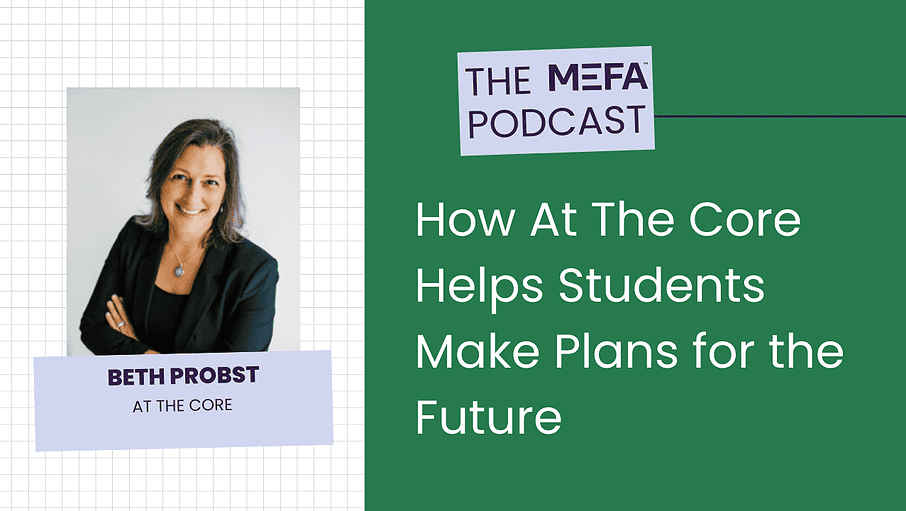

Resources Mentioned in this Episode
Jonathan Hughes: [00:00:00] Hello, everyone, and welcome to the MEFA podcast. My name is Jonathan Hughes.
Julie Shields-Rutyna: And I’m Julie Shields-Rutyna.
Jonathan Hughes: Oh, hello, Julie. How are you?
Julie Shields-Rutyna: Oh, I’m doing, doing okay. It’s a Friday.
Jonathan Hughes: It is a Friday. Yes, it’s a rainy Friday. Well, today we have Beth Probst on the show, and you’re going to hear my conversation with her a little bit later on.
She is the founder and president of an organization called At The Core. This is an organization that really seeks to help students right at the beginning of their college and career journey. to help students to get to know themselves so that they can identify the right path for them, and whether that results in college or career or the right college or the right major or the right career path you know, to really [00:01:00] get them started on the right journey. So she’s got a great story of how she came to identify this need and create this effort to address it. And she’s going to have great perspective for students and parents. So stick around for that. But we have other things to talk about first. Right, Julie?
Julie Shields-Rutyna: We certainly do. We have a lot to talk about.
But I think what we should talk about right now is the fact that at long last, the Federal Direct Student Loans are set to re-enter repayment now after, after these few years. And so this is the first time in about three and a half years that federal direct student loan borrowers are going to be expected to make monthly payments. That will be an adjustment for everyone.
Jonathan Hughes: Yeah, I know that you know, personally, my household is going to be affected by this. We start making payments again next month, which I’m thrilled about, obviously.
Julie Shields-Rutyna: Well, you know, John, usually I tell you you’re unique, but on this issue, you are one of 43 million [00:02:00] people in that, in that position.
Jonathan Hughes: And then I run into reality again, just like right now.
Julie Shields-Rutyna: So we talked about this before on a show, but there are a few different dimensions of re-entering student loan repayment. Like how are you going to absorb that payment into your budget again? Watching out for any scams that might be out there and also making sure people know how to get in touch with their servicers.
So we can link to this information in the show notes. And we’ll link to the episode that we did with Betsy Mayotte from the Institute of Student Loan Advisors about loan repayment that everyone should listen to. But having said all that. I want to highlight an option that people have to take the sting out of this return to repayment a little bit.
Jonathan Hughes: That’d be nice. Tell me about that.
Julie Shields-Rutyna: Well, it is a new repayment plan that’s, that’s come out of this and it’s called the SAVE plan, S A V E, which stands [00:03:00] for Saving on a Valuable Education. And it’s a new income based repayment plan. So, what does that mean? Well, on Federal Direct Loans, the standard repayment term is 10 years. But there are lots of other repayment plans that you can join. And that’s one of those federal direct student loan benefits that aren’t available with other loans. And that is, you know, just the flexibility and the options you have in repayment. So if you can’t make your 10 year standard repayment you can stretch it out from 20 to 25 years and make your monthly payment lower.
And on income driven repayment plans, your monthly loan payment is then based on your income. So how much you pay is calculated based on your discretionary income. So currently there are a number of Income Driven Repayment Plans and they each have their particular specifications. [00:04:00] So some may look at spousal income if you’re married as well as your own.
Some may not. Some have different percentages of income that they look at. So it really depends. on your situation, which income based repayment plan will give you the lowest monthly payment.
Jonathan Hughes: Give you the lowest monthly payment. Okay.
Julie Shields-Rutyna: But this new income based plan called the SAVE plan probably carries the most generous repayment terms for many borrowers.
In other words, it will probably be a good choice for many borrowers. So first of all, the discretionary income calculation is really generous. The way they do this for all of these income driven repayment plans is that they take the federal poverty income level and say anything above a certain percentage of this is your discretionary income.
And so this new save plan increases that percentage from 150 percent to 225 percent of the federal poverty guidelines. So that means it’s a [00:05:00] lot less of your income that they’re looking at. And it also reduces your payment amount so that. Previously, the lowest percentage figure your payment could be is 10 percent of your discretionary income.
This cuts that in half to 5%.
Jonathan Hughes: Okay, so your monthly payment on this plan then is 5 percent of your discretionary income, which is what you make Over 225 percent of the poverty income level.
Julie Shields-Rutyna: Correct. Okay. Yeah, and if your monthly payment isn’t enough to pay off interest, the remaining interest is forgiven on a monthly basis.
Jonathan Hughes: So how about that? So if you’re, yeah, so if you’re monthly payment, if that 10 a month, but you’re, you’re, you’ve got 20 a month of interest that accrues. So you’re not paying down the balance, you’re not even paying up the interest. Whatever you’re not paying in interest is just forgiven as long as you’re making payments.
Julie Shields-Rutyna: Yes. And that’s [00:06:00] not worrying about it. That’s brand new because we have heard over the years, many students who’ve been making their student loan payments, but then they’re. Balance keeps going up and this will not happen on the new save plan as long as they are making their payments. And actually any remaining balance, as long as you’re making payments, will be forgiven after 20 years on undergraduate loans and 25 years on graduate loans.
Jonathan Hughes: Well, that does sound very generous. I already told my wife about it who has loans for her undergraduate education still. So we are definitely going to check that out. And actually she asked me today if I will help her sign up for that. So what do I need to do to sign up for it?
Julie Shields-Rutyna: Yeah, I’ve been talking about it too, honestly. So you should visit studentaid.gov/save, and we can link to that in the show notes. And I want to say this, you do need to discuss the various repayment options with your servicer. This is the second [00:07:00] time we’ll quote Betsy Mayotte of TSLA. You’ve got to put your patient’s pants on is what she says when dealing with your loan services, because services are really, really busy at this point.
And you know, I mentioned. 43 million borrowers are headed back into repayment. So call early, leave a message and try all sorts of ways to get in touch and just know you might be on hold be doing some other work, have a book, whatever, just so that You stay on hold and you do talk to your servicer if you have questions about that.
Jonathan Hughes: Alright, well on that cheery note, it’s time for the MEFA Mailbag. And so these are questions that have come into us over the past weeks and been answered by our college planning team. So remember, if you have any questions, you can email us at college [email protected]. You can call us at 800-449-MEFA.
You can you can reach us over social media on Facebook at @MEFAMA on X at @MEFATweets and on Instagram at [00:08:00] MEFA_MA. So I’m going to come clean this week. This question is not an actual question that came in through email or the phone, but it will be. And because it’s a change that’s coming up to the facet that people ask about all the time.
It’s a new change. It’s a good change. So we want people to know about it. So it concerns college savings for siblings. And so it used to be. We would get people calling all the time that if they have college savings for each of their three children, for example, and they’re filing a FAFSA for one of their children, do they have to put all of their kids 529 amounts of college savings amounts for as an asset on this FAFSA, or do they just stick with it, the child that they’re filing for. Julie, what’s the
Julie Shields-Rutyna: answer? And so you’re right. It used to be that they used to have to list all of the 529 accounts that they were the owner of including all of the [00:09:00] siblings. Now the change is a parent only needs to report the 529 account that is the one that for the student intended for the student who’s filing the FAFSA. So they just have to put the amount of that one 529 account moving forward.
Jonathan Hughes: Very popular change, wouldn’t you say? Yes.
Julie Shields-Rutyna: It’s great to have good news, isn’t it? I love good news.
Jonathan Hughes: All right well one more time. If you have questions, email us at college [email protected]. Call us at 800-449-MEFA, Facebook @MEFAMA, X @MEFATweets and Instagram at @MEFA_MA. Just to remind you, we have a bunch of college guidance experts that are waiting to answer your question. Now let’s go to my conversation with At The Core’s Beth Probst. Since 2012, At The Core has inspired parents of college bound students to think strategically about how to select the best fit college, major, and career so they don’t [00:10:00] end up wasting precious time, energy, and money, this is according to their website, to get at the core of who they are and how to use this knowledge to propel them.
The work encompasses a variety of high school, college, and career exploration services so families can make decisions with confidence and clarity. Now here to tell us how they do all that is the founder and CEO of At The Core herself. Beth Probst. Hi, Beth. Thanks for being on the show.
Beth Probst: Hi, Jonathan. Someone smart wrote all that stuff. I have to give kudos to my teammates that put that together so succinctly. And it is, you know, it’s interesting. There are a lot of folks out there, of course, that That helps students along the journey. And I know what we do is a little bit unique. And I welcome the opportunity to talk about that and share some tidbits with families that they can take home and use with their own teenagers.
Jonathan Hughes: Yeah, I loved learning all about it. So why don’t you tell everybody sort of [00:11:00] exactly what at the core does and how it does that?
Beth Probst: So in a nutshell, we focus first on self assessment. We want every kiddo to have a strong sense of who they are, what they enjoy, what they struggle with, what they’re good at, what their lifestyle goals are, what they value.
That can then be used to help connect them to careers to explore. These are some, some careers that can be a great fit that will play to your strengths and play to your interest and help keep you away. from the things that you might struggle with. And then third, we help with that educational path planning.
So once they’ve done those first two steps, they stand on a pretty sturdy foundation as they get ready to make the decisions of what to do, especially after high school, and that’s usually tied to the kinds of careers and career paths that they’re thinking of. So is this career path that I have my eye on better [00:12:00] served by going and getting a BS or BA am I better to enter that career path through credentials or certifications or other short term educational experiences, or do I really need like a master’s degree to do that thing that I want to do?
So again, self assessment connected to careers to explore, then connected to educational path planning.
Jonathan Hughes: And a lot of that time, a lot of the times. People get that backwards, don’t they?
Beth Probst: They do, don’t they? Yes, they jump right to college. You know, kiddo’s going to go to college, and that’s often the focus. And I think a lot of that though, Jonathan, is from generations past, right?
That was kind of that, I don’t want to call it a golden ticket, but it was, the idea was if you go to college, you’re going to get a better job. And of course today’s environment. Surrounding college has changed since I went you know, [00:13:00] since, since multiple generations ago. So it’s an interesting it’s an interesting set of circumstances that surround our families today as they make these decisions.
Jonathan Hughes: So trying to get students to proceed from the point of knowing what they want to do and then matching. up the right experience. How exactly do you do that?
Beth Probst: Well, the way that we do the one on one work with students is and again, I can talk more broadly about some of the things we’ve learned from that.
But the one on one work that we do together with students is all interview based. So I don’t know about you, but I’ve taken plenty of Online assessments. And over the years, not only from a career perspective, even as a student, but in my professional career in my first career was in software and software industry.
And we would take things that were trying to help us in career development and in putting together teams, right? We would do online [00:14:00] assessments. And the issue with those is that students can sometimes answer aspirationally. A lot of times they’ll end up getting a list of careers back from something and they’ll say, well, I know those aren’t right, or there’ll be one that doesn’t feel right to them.
So they throw out the whole list, you know, and it’s like, no, they may not get any counseling associated with it. So we do something that’s kind of different. It’s all interview based. So imagine one on one as students sits down to talk about it. Their experiences, their strengths, their preferences all their lifestyle goals.
1 on 1 with a facilitator 5, 1 hour interviews. And then that facilitator does the work of really analyzing they collaborate on every student that they work with. They come back to the student with their findings along with so most of our facilitators have deep career advising experience as well.
So they’re able to come back with kind of a tailored or cultivated list of [00:15:00] careers that that student can consider. We don’t have a magic wand and no one can say, poof, you should be this, you know, but we want to give that student some starting place careers. Then we teach them how to do the career exploration.
Which is super fun because they have no idea how to do that. And they get pretty excited about knowing how to learn about the careers that are out there that they might have never even heard of before or had a preconceived notion about. And then they get to swing open the doors and learn more about what that career is.
Very, very helpful and valuable. But that’s a process we use that we call guided self assessment. So it’s a self assessment process, but done together with a guide. Someone who’s right there with you all the way that’s not your mom or dad. Because that’s, I think we’ll talk about parents and that relationship in a bit.
But that, that is one of the things that’s nice about the process that we use is that it is that third party.
Jonathan Hughes: You mentioned that your [00:16:00] background was in software design. So how did you come to start this work?
Beth Probst: So this work happened at a time when I was able to be home with my kiddos when they were young. And at around that time, I was watching I was watching people in my life that I loved who were older than my own children start to make that transition from high school to college. So nieces, nephews, family, friends, neighbors, and they were. When I would ask them questions, you know, a lot of people will just ask, what college are you going to go to?
I was asking some different questions and these kiddos did not have great answers about why they were making the choices they were making. And I, I was, I knew they were getting ready to spend a lot of money. And it felt like a very shaky situation, right? And everybody would admit that it was a little bit shaky, but they didn’t know how to solve the problem.
They didn’t know [00:17:00] how to make their child more confident. So, I had had a lot of experience with interviewing. In my first career, and I thought, can I do some structured interview process with teenagers that would allow them to, to be kind of guided through a set of questions that let them shine a flashlight on the key elements of who they were, that was really the genesis of the idea was, was, can, is there a way to do that?
And I thought, yeah. Do I really want to sit down and talk to teenagers? I didn’t have any at the time. And I thought, and it has been amazing. They are the coolest people and have, I know you’ve had a lot of interaction with teenagers as well. So that’s really how it’s. And then it just grew from there.
And I’m, I’m very fortunate to have a team of about 15 people now who all do amazing work with students.
Jonathan Hughes: How did you develop the questions? Did you just start talking to these [00:18:00] kids and then sort of figure out what the important things were?
Beth Probst: I kind of worked it backwards. I knew from working, in a lot of different environments that paying attention to your own strengths, your own struggles, your own values, your own career goals and lifestyle goals, how you want to work every day, what tolerance do you have for long work hours? You know, do you work better by yourself? I knew all those little tidbits from work experience were important. So I thought, why don’t we just go backward and start to ask students those types of questions? What do they know about themselves and pull that out so that that data can be used to start to put together a scaffold of Potential careers that could be a fit for that student that they can explore.
So it was, it was really a process that started with a set of questions. I think the 1st students I did we just did 3, 1 hour interviews and then I [00:19:00] added some additional, hands on activities that we did during the interviews, and then I added some more homework, and then other facilitators started to hone the process more.
And then it grew to 4 interviews, and then it grew to 5. And so, so we just had more and more. We wanted to ask. So, you know, and it’s interesting to these students. I, I think they’re like, we’re going to sit down for 5, 1 hour interviews. Really? And do I really have that much to say about myself? And, and they may go in a little bit not.
Yeah, skeptical, but not quite understanding. And the coolest thing is that they once that once the groundwork is laid and the door is open and they can start talking about their experiences, we have learned that they do know quite a bit about themselves. They just have never been given. a forum to talk about those experiences that they’ve had and to do so in a very honest and forthright [00:20:00] way.
So I love when a student says, you know what, I’m really good in this particular class and everybody thinks I should do this or something with this, but I really hate it. And this and this and this. And it’s like, that was awesome that you spoke that. Own that, said that, because then that can become part of the conversation for your journey going forward.
Jonathan Hughes: So what are some of the things that, that you’ve learned in these initial discussions and then in the later discussions with- what are the things that come up again and again and again?
Beth Probst: Well, there’s a there’s a couple of different kinds of students that we see commonly. One is a student that may be really good at lots of things, and they don’t, they’re very fearful of making a decision, right?
So if I’m, if I’m one of those, those students who has A’s in almost everything. Things in high school come pretty easily for me. How do I [00:21:00] decide, right? So that’s one thing we’ve learned is that that student is not uncommon. And they don’t, they feel sometimes like they might offend a teacher if they don’t, you know, choose to go into that field that they’re in.
And so that one’s, that one’s troubling because that student really needs something to get unstuck. Similarly, we see a lot of students on the kind of the other side of the fence who may not really enjoy anything in high school. Oh yeah, they’re not, they’re like, Oh yeah, when is the bell ringing?
When can I run screaming from this building? And so that kiddo also, no fault of theirs that the base work of high school hasn’t connected or resonated with something inside of them, but they’re just as lost, right? How do I make a decision if none of the things that I’ve encountered feel [00:22:00] like a connection?
So bottom line is they all want a confident path. They want to make a good decision at the end of high school, but they’re not. Especially those two types of students and others in between on, on that spectrum, they don’t know how to make that decision. So, that’s one thing. The good news is though, that if they are prompted to talk about and think about themselves, they really do know quite a bit.
About what makes them tick if they’re given that chance to really talk that through the third thing. I would tell you that we see universally. And I’m not being mean to teenagers when I say this, but oh, my goodness, they know nearly nothing about real world careers. Nearly nothing.
Jonathan Hughes: Yeah, I knew nothing about it myself. I know that. I mean, I have a hard time imagining a lot of teenagers that do.
Beth Probst: Well, and think about why, right? [00:23:00] So, so in their day to day high school world, they have their head down and they are doing, you know, they’re studying for the next quiz, they’re writing the next paper, they’re getting ready for the school dance or for a game or a club activity, or their, their job. They have their head down. They’re moving like this. The, the world of careers seems pretty foreign to them and their only engagement points with it come into play. Maybe if they hear a parent talking about something that happened in their working world, or if they go visit a professional a doctor or a dentist, or they see a nurse or a physical therapist or something like that, then they encounter that professional.
In that little minute way and have a sense of what that job is like. And then there’s social media, television programs, movies, etc. That often portray jobs in in, in accurate light? Inaccurate, that’s the word I need to say carefully. So then these kids get a sense of, right, it’s the [00:24:00] CSI effect, right?
All crimes are solved in less than 60 minutes. What the heck, right? And I would like to do that inside, you know, so, so that’s troublesome. Is that those are their only limited views of careers. And I love to be part of the help in in really opening that student’s mind to all the careers that are out there that can connect to the things that make them.
Who they are. And, you know, I don’t know about you, Jonathan, but we’re, we’re very set and motivated by helping every student move toward work they will love. I want students to travel to their workplace, wherever that may be, five or ten years from now, and to turn on their technology that they’re going to use for their job, whatever that may look like, and to be really happy and joyful that they get it.
Get to do that work because it plays to their strengths and their interests and their [00:25:00] lifestyle goals and what they’re looking for.
Jonathan Hughes: What about college? How well do you think students know about college and what’s expected to get in and to pay for college?
Beth Probst: I’d say more than they know about careers. But still what they know is limited on some level by just their exposure, right? So, so maybe they have an older brother or sister who’s already made that transition to college. So they’ve watched that. Maybe they are in a group of students who are attuned to that kind of their radar are up and they’re paying attention.
And maybe they’ve been too. Some college planning sessions along the way, either through their school or through a third party when a student has done that, then they can be a little bit more informed on what does tend to happen, though, in certain parts of of our country is that there is sort of an unhealthy focus on a handful of colleges, right?
It’s the old these are the [00:26:00] names, you know, the preconceived notion of of prestige. And then, you know, that high school. Freshman starts wearing a sweatshirt from, you know, one of these to be unnamed colleges, and then the focus comes onto that. So that’s also can muddy the waters a little bit. So I don’t think they know a ton, but they know they certainly know more than they do about the concept of getting into college than they do about careers.
Jonathan Hughes: You’re based in Ohio. Is that correct?
Beth Probst: We are. Yes. And yet we serve families. So one thing COVID did for us. We ended up taking all of our educational webinars online. And so we have followers from all over the country now.
Jonathan Hughes: That’s great. And are you able to counsel people remotely or-
Beth Probst: Absolutely. Yes. So that so not only do we do that interview process that we call guided self assessment with students, we do that. If families in California, of course, we’re not going to meet face to face for those interviews. If the family is local to us where we have a [00:27:00] facilitator, we can do those meetings face to face.
Same thing with our educational planning work that we do with families. We can do that online or in person.
Jonathan Hughes: And I wanted to ask, you know, since we talked about college and career, are you seeing more students choosing career pathways right out of high school versus the default, maybe going to college before, you know, sometimes what it is that you want to do? Are students sort of branching out from that?
Beth Probst: That’s very interesting that you say that you know, we have tended over the years to To focus on that. Those families are they’ve come to those families that come to us are those that are thinking college. 1 thing we have seen growing in a swell over the last certainly 7 or 8 years is career and technical education and another big 1.
Are some loud voices in various communities about workforce needs so, you know, that, [00:28:00] that we’re, we’re starving for, you know, electricians were starving for, you know, these medical professionals were stuck, whatever it is. Right. So, so those other voices that career tech and that those workforce development voices are becoming part of that conversation that high school students and families are hearing.
So, if they’re thinking just go to college, they seem to now be naturally. Having some touch points or at least some thought process around why is why am I going to college? What am I hoping to accomplish? And what is the best way to accomplish that? And how will that be connected to the kinds of work that I might have already had some experience with through perhaps a digital design career technical program while in high school?
You know, did that experience make me Want to go into that field more, or will I redirect to something that’s a better fit for me? [00:29:00] So those early experiences and exposures are key, and they will help guide a selection to college that is more aligned with what, you know, the purpose and the reason of why that students go in college.
Jonathan Hughes: And do you think there are other factors that are driving that as well? You know, you, we’ve heard from need, so communities are actually telling you, or, or exp, you know, expressing that they need electricians or, or plumbers, et cetera. What I’m trying to get at, I guess I’ll just ask, is cost for sure playing a role?
Beth Probst: A hundred percent. And in fact, yeah, that was, that was that is the overriding Pain point. You know, it’s so interesting. Jonathan, we see it all. And I know you do too. There are families who I don’t want to say haven’t been paying attention to the details, but let’s just say that and they know what college costs when they went and now their kids are on the horizon of going and they know it costs more that they don’t.
They’ve not really [00:30:00] looked at the numbers, right? Those families are often like, you’re kidding me. Right. You’re kidding me that a year at my state school, you know, is that I went to is now 30, 000 for one year. It’s it like is mind blowing. The cost, no matter what, even if you’ve thought about it before, even if you’ve been saving since they were two years old, it is a huge investment that someone is getting ready to make.
And none of us want to make that investment without. Well, like I described at the beginning, no one wants that shaky, Oh, my kiddos not sure why they’re going or, or, you know, with the graduation party, you ask the kiddo what they’re excited about, you know, as they get ready to head toward college and they say, football games and parties and you’re like, wait a minute what classes are you going to be in?
What, you know, and so I’m, I’m teasing because that of course is part of the. The college experience. But, [00:31:00] but I think the cost is, of course, a looming factor for every family. Almost every family. There are very, very few out there that aren’t at all concerned about that. Most are, especially if they have more than one child and they all would like to pay less for college.
But one of the key ways to pay less for college is to have a purpose of why you’re going and to that really can help motivate that student to stay on track. For Finish up that program, that four year program in four years, which you know, of course, less than half of all students will finish that four year program in four years, which is just mortifying.
And I, I, I think for all students engaging in those college years in things that are going to help them build that resume. toward that first full time job. But that has to happen by, you know, having a sense of why you’re there and what kinds of internships or co-ops you might seek while you’re in college.
So all that comes back to the high school years and doing things to really engage and try things [00:32:00] out, learn about careers, take stock in yourself you know, who you are and what makes you tick. Those are the things that are going to help make great decisions at the end of high school.
Jonathan Hughes: We speak with parents a lot, probably more. Parents than students. So I always like to ask about parents in this process. What role do parents have and at the core?
Beth Probst: Well, when we do, so for families that engage with that one on one interview process, when they’ve, when they’ve Gifted their student with that time to consider and think they’re not actually involved in that interview process at all.
And I often tell students that that that’s because if my own mom or dad was sitting next to me, if I was interviewing a student, you know, that would impact how I so it’s all those. Those families aren’t involved in that process, but once the interviews are done. And the next steps of career, they, they absolutely engage fully, they, we kind of do a handoff to the, the family at that [00:33:00] point.
You know, I will also say just in general, as we think about students and parents in high school and planning for what comes after high school, a big thing we see that impacts parents and students are the expectations parents have. And sometimes they’re spoken. And sometimes they’re not spoken and, and then so, so, so that lays out there almost like a, like a cloud blanket in some families, like, and the kids feel it, they feel those expectations and sometimes they don’t feel like they can speak up about what it is that they want from their lives if these expectations are there.
Seem to be set in stone. So I think, you know, I would just encourage all parents to, to try to set aside those expectations. Remember that what we want for our kids is what is best and good and right for [00:34:00] them. Whoever they are, they get to live their life. And, and the other tricky thing that happens, Jonathan, too, I know you’re going to be experiencing this soon as our kids get older they, they we as parents aren’t necessarily the point of reference or the first point of reference or, or information that we used to be when they were younger.
They push us away, rightly so, that’s what they do to become independent. But it’s at a time when we really need them to listen to us. We’re like, no, no, no, you need to listen, but they’re getting it from others. So I think strategically engaging with third parties can be a real card that a lot of families choose to play, right?
They may have a trusted advisor on the financial side on the college planning side. That can be very, very helpful to sort of bridge the gap between A parent and a student who may be having some trouble [00:35:00] communicating.
Jonathan Hughes: If there was one thing that you would say to students or to parents, maybe they’re in high school, maybe they’re just starting to begin this whole process and they maybe feel a little bit overwhelmed. Maybe they’re like a lot of things who don’t actually know. Exactly what it is that they, they want to do. What would you say to them?
Beth Probst: I think number one is don’t discount paying attention to those voices that you have inside of you that are telling you what, what you believe and what you know is right.
And what you think is interesting, that is the, the launch point for all good decisions. And then, and then I would add to that. And oh, by the way. Don’t wait for others around you to teach you about real world careers. You’ve got to dig in and use some of the amazing free resources that exist that are out there online.
There’s tons of summer programs and camps and workshops and online stuff that you can do [00:36:00] that will expose you to the different worlds of careers that you didn’t even know were out there. And I think. Those two things, right, that self assessment and that career exploration are always going to make for a student who’s more ready.
It’s a given that they’re going to do what they need to do during high school. That’s a given. You have to take these classes. You know, you know, you’re moving toward finishing up high school one day, but the neck, those two that I just described are going to be the keys that unlock the door to joyful next steps after high school and meaningful.
If you’re going to make that investment in college, you know what? It probably should be aligned with some specific reason, a set of things that you’re hoping to learn while you’re in college. So most students tell us, I’ll just close with this, Jonathan. They’ll tell us that the reason why they’re going to college, I’ve asked thousands of students this, why are you [00:37:00] going, why does anybody go to college?
They say to get a better job. They say that they know that they know it’s to gain those skills that cause them to get a different job than they would be able to get. Perhaps one that pays more or has a different, set of requirements that I can do because I have learned to do that during college.
That means you actually have to think about what you want to learn during college and what, what at those four years of college go very, very quickly. And I want that student to be prepared to make that transition to the working world with confidence and with clarity.
Jonathan Hughes: Now, if people, if students wanted to take advantage, they wanted to, to. Seek out what you had and you know, maybe talk to somebody or look at some of your webinars or some of your materials, where can they get in touch with you?
Beth Probst: They would just hit our website. We keep it up to date at all the up to date all the time. It is getting at the core. com. So www.gettingatthecore.Com. And you’re right, [00:38:00] we do a ton of free webinars, low cost webinars related to educational path planning. We do a workshop here in town for students in grades 7, 8, 9. We do that guided self assessment process and lots of other things. Many families just sort of put us on speed dial because we always welcome quick questions.
If it’s a quick question about anything related to, to self assessment, career exploration or educational path planning, and you call us, we will answer the quick question.
Jonathan Hughes: Sounds great. I know. Well, Beth, it was great to talk to you. You too. Thank you so much for being on the show. I really enjoyed it.
Beth Probst: Thank you.
Jonathan Hughes: All right. That was it, everyone. I want to thank Beth Probst for being here and sharing her experience and her expertise with us. And remember, everyone, if you liked what you heard today and you want to know more about planning, saving, and paying for college and career readiness, well, then follow the show.
You can find us wherever you get your podcasts, and please remember to review us. [00:39:00] Because it helps us to do What we’re doing and getting and to get this show out to folks like you so Julie. Thank you. Once again. Yes Thank you, Jonathan. You can tell it’s been the end of a long week. I Also want to thank Sean Connelly our producer and AJ Yee and Lauren Danz for their assistance in posting the show Once again, my name is Jonathan Hughes and this has been the podcast. Thank you.













